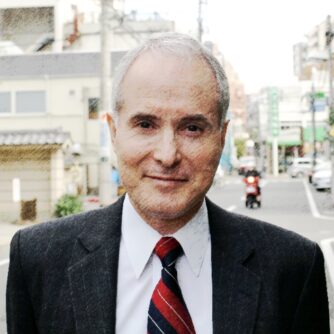Jin is a communicator. And, a great one, at that. An aspiring novelist growing up in Hawaii and studying in New York, fate (and her father) would alter her career journey to public policy work in Washington DC. Then another twist of fate (moving to Singapore with her husband) catapults her into the corporate world. Honing her skills in corporate communication at several well recognized brand companies, she is currently one of the most unique board of director at a Japanese corporation that I have ever had the pleasure of meeting. What are the secrets of transforming a quintessential domestic Japanese company into a diversified global corporation with growth potential? It is about unleashing and empowering the people, through none other than instilling a communication culture.
https://www.lixil.com/en/about/board/board_montesano.html
Jin emigrated to Honolulu, Hawaii from Korea with her parents when she was about three years old, where her father started a small produce business. He eventually became the third largest papaya grower in Hawaii. Jin always talked fast, thought fast, and walked fast. So, not really fitting into Hawaiian life, she decided to go to the mainland for college. Her father was obsessed with education, and she was a decent student. Her mother on the other hand cared less about academic success, putting more priority on health and happiness, and having people you respect and love around you.
Jin started speaking before her first birthday, so everyone thought she was going to be a lawyer, or perhaps a job with lots of communicating. In her younger years before her father became successful, Jin grew up with little money, so her luxury for being a good girl was a trip to the Hawaii State library. Jin loved reading books. She wanted to be a novelist one day.
Her aspirations led her to the English department at Columbia University. Jin even got a bartending license in New York, so she could work at night and write during the day. New York took over her imagination. Just wandering around the city to observe the scenery and landscape gave her lots of things to write about.
However, Jin got a rude awakening. Her father said, “You are not going to be a writer and starve,” and urged her to be a lawyer. Not wanting to pursue a law degree, she dodged the situation by going to public policy school.
Being interested in how politics and policy come together, she received a two-year fellowship to study at Princeton University’s Woodrow Wilson School (now renamed the Princeton School of Public and International Affairs). She became interested in International Relations, and studied Northeast Asia security policy issues. Jin studied under giants in the field such as Kent Calder and Robert Gilpin. (Former Federal Reserve Chairman) Ben Bernanke taught her macroeconomics.
After Princeton, Jin went to Washington DC to work in public policy at the Korea Economic Institute to focus on legislative affairs related to US-Korea relations, US-Asia trade and economic policy. She was head of congressional affairs, so she spent a lot of time on the Hill and became a quick study on the topic of stakeholder management. Her first week on the job, she was handed a copy of Roll Call’s ‘face book,’ a congressional directory of every member including a photo, relevant details about their voting record, Committee seats, and so forth. She was given a week to memorize the relevant members to the issues she would be working on. Jin describes Washington DC as being a bit like Hollywood in that it’s filled with famous people, but just not as easily recognizable. Being able to recognize someone and make a connection can be a critical skill for life in DC.
The reason she shifted her career from government policy to the corporate world was because she moved to Singapore. She joined her husband, Michael Montesano, who went to teach Southeast Asian history at the National University of Singapore.
Before moving to Singapore, Jin was working for a US government think tank, the Asia Pacific Center for Security Studies (currently the Daniel K. Inouye Asia-Pacific Center for Security Studies) in Honolulu. She was a Research Fellow focused on Northeast Asia security policy. In Singapore, however, Jin had no job, no friends, and no connections. She had also never lived outside of the US except for a summer internship with the US Embassy in Seoul in 1994.
At 29 years old, professionally speaking, Jin had to start over. This is 1999 and the internet was just beginning, so the most reliable way to search for jobs was still the job ads. Jin read the Recruit Section of the Singapore Straits Times every week. Jin applied for various job postings in communication roles, but all she received were rejections one after another. Most of them said, “You don’t have communications experience.”
One day, she got another rejection letter. However, the human resources head at that company found Jin’s application letter amusing enough that he took the liberty of passing Jin’s CV to a friend at Ogilvy PR. The American running that operation said that since Jin could presumably read and write well, she would hire her. However, the offer was to start at the bottom, as an Associate making 1600 Singapore dollars a month. While it was a shock at first, she now says that was the best decision of her life.
One day, the regional president of one of her clients offered her a position within the company. Jin decided to take the leap from the agency side to in-house corporate work, and has never looked back.
Jin loves a crisis. “Never let a good crisis go to waste,” she says. Every time her career has made a turn for the better, a crisis is somehow involved. When a crisis pops up, Jin becomes dead serious and focuses on navigating through it. She over-communicates with executives to get them aligned to what needs to happen.
A crisis will help good communicators shine. Everybody feels vulnerable and exposed during a crisis, and she says it is the communicator’s job to step forward and take charge in developing a proper response strategy. Lawyers will often shy away from commenting too early, often because the firm still does not have all the answers to the questions or is worried about the downside risks that can come from a poorly devised communication strategy. Communicators will say even if we have fewer answers and more questions, we need to say that. Lean into transparency. Lean into dialogue.
Jin believes that the court of public opinion can sometimes be more powerful than the legal courts. When you lose in the court of public opinion, it takes years to recover the damage, and new legal constraints may come in and impair license to operate. Being very clear about where you stand, and how you and your actions are perceived are very important. “It’s not the crisis people remember, but how a company responded to it,” she said.
In 2014, Jin got a call from Yoshiaki Fujimori, her old GE boss. He was on his way to Davos. As the CEO of a rapidly globalizing LIXIL, he asked if she would be interested in coming to Japan to work with him again. She was intrigued. Jin told Fujimori that she would consider it if a competitive recruiting process was put in place. She made this request because she believed a proper stakeholder management process was important, especially if a foreigner like her was going to join a Japanese company in a senior position.
So, after this process, Jin joined LIXIL in 2014. When she first walked into LIXIL’s office space, she remembers being “stunned.” Jin felt like she was entering a Japanese TV drama scene. Everybody’s head was down, and it was very very quiet.
Jin inherited a team that didn’t speak much English. Yet, at the same time, everybody was very warm to Jin. They were all humble, and not at all arrogant of being “number one,” which was the corporate environment that she was used to. Everybody was open and willing to learn. They were of course a little bit nervous about what globalization would mean for them, but it was the new direction of the company, so “please help us” was the message that Jin received.
Just a few years earlier in 2011, five Japanese companies Tostem, INAX, Shin Nikkei, Toyo Exterior and Sunwave had merged to form LIXIL, and they had acquired Grohe of Germany, American Standard, Permasteelisa of Italy, and had 30,000 employees outside of Japan.
Fujimori retired in December 2015. Globalization was done, and LIXIL was now a huge company with strong growth potential, but perhaps could have done a better job with synergy and integration. The company had poor ROE (return on equity) as well as a lot of debt on the balance sheet.
Now enter phase II of the LIXIL story. Kinya Seto, founder of MonotaRO and a successful serial entrepreneur, joins LIXIL as CEO in Jan 2016. He starts to transform the company from a diversified conglomerate of unrelated assets into a stream-lined and integrated company. Kinya divested dozens of entities and focused the company around housing and water technology.
With rapid transformation of the organization, a proxy battle ensued for control of the company’s direction in 2018. The shareholder battle ended with the 2019 AGM when shareholders, in an unprecedented turn of events, voted all of Kinya’s candidates onto the Board, including Kinya himself, as well as some candidates nominated by the corporation. LIXIL’s shareholder fight ended with a rather large number of directors on the board and much work to do.
Kinya returned as CEO of LIXIL and was determined to ensure LIXIL enhanced its corporate governance going forward. The newly appointed chairman of board, Masatoshi Matsuzaki, is widely recognized as a champion of corporate governance. Therefore, the company was very comfortable to move towards external directors being a majority of the board. LIXIL enhanced many aspects of its governance, building on the committee model by operating a nominating committee and compensation committee led by Outside Directors.
LIXIL recently held their AGM on June 25 (after taping of the podcast) and now have 10 directors, of which 7 are external and 3 are internal – the CEO, CFO, and CPO (Chief People Officer), who is a woman and non-Japanese. Among the 7 Outside Directors, two are notable female professionals from the legal profession. No other company in Japan has this kind of governance structure.
When Jin was invited to be a board member, she felt honored because the nomination showed the board was serious about wanting to better understand the people strategy. According to Jin, investors also have a strong interest in LIXIL having the right people strategy to support the overall corporate direction of the firm.
The integrated report published this year is the most comprehensive explanation of how LIXIL creates of corporate value (https://ssl4.eir-parts.net/doc/5938/ir_material_for_fiscal_ym10/102937/00.pdf). While working with Kinya on that report, Jin understood Kinya’s strong focus on people, and specifically on creating work conditions for their success.
One of the areas LIXIL has worked hard on was to break down the “top-down” culture. Kinya was adamant about getting rid of it, and replacing it with a more “bottom-up” culture, being free of fear or retribution. LIXIL has put into place many initiatives to support managers and employees embrace this new culture.
They introduced new technologies for communication, and people immediately got onto it. Tens of thousands of employees are on Workplace today, produced by Facebook, which is a closed in-house social network system. It can be used to immediately reach all 55,000 employees, and the nature of the SNS platform has caused an explosion of in-house communication across teams and geographies. In short, it has removed the traditional hierarchies and walls which governed communication within the company, making communication more democratic.
For example, one day, a showroom representative posted a question about why women have to wear high heels as part of their uniform. Kinya picked up on this, and asked the same question, “Yeah, why is this?” 24 hours later, the dress code was changed and women were able to wear what is comfortable to do their job. Company policies should not be decided in this way, but it is an example of how quickly information can move and ideas are spread when social networks exist within a company. Unlike other companies, LIXIL doesn’t manage the conversation of the executive, and thus senior executives are closer to the workforce.
LIXIL’s corporate culture today is summed up by the “LIXIL Behaviors.” Values are often not visible, but behaviors are visible, so therefore feedback is possible. There are three LIXIL Behaviors: Work with Respect, Do the Right Thing, and Experiment and Learn.
Despite the different geographic areas with their own cultures, these three behaviors are the common denominators necessary to be a LIXIL person. LIXIL aims to become a safe environment where everyone can be authentic and openly communicate with one another. Leaders and managers at LIXIL are encouraged to navigate this kind of new environment. This is a real change from the past.
For the young Japanese talent, they feel especially energized to embrace more proactively their career journey. LIXIL operates in 150 markets. “If you’ve got an idea where you want to take your career, embrace it and be bold,” says Jin. In the end, Jin believes that happier employees will make the company much more successful.
As a last message, Jin offers these words. “To achieve transformation, it must start inside out, it must start with people which are the most important asset for the company. Unlocking that asset is not easy as it looks. But can you afford not to do it?”
Well said. A new model for Japanese corporations.



